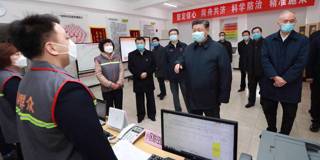Because President Xi Jinping has concentrated more power in his own hands than any Chinese leader since Mao Zedong, many within China and around the world have concluded that he is politically unassailable. But the coronavirus epidemic has come at the worst possible time, laying bare the fundamental weaknesses of Xi's rule.
ANN ARBOR – In contemporary China, profound political transformation can – and has – taken place in the absence of regime change or Western-style democratization. The starkest example is the period of “reform and opening” that began in 1978 under Deng Xiaoping’s charge. Although Deng rejected multiparty elections, he fundamentally changed the direction of the Communist Party of China (CPC), as well as the distribution of power within it.

ANN ARBOR – In contemporary China, profound political transformation can – and has – taken place in the absence of regime change or Western-style democratization. The starkest example is the period of “reform and opening” that began in 1978 under Deng Xiaoping’s charge. Although Deng rejected multiparty elections, he fundamentally changed the direction of the Communist Party of China (CPC), as well as the distribution of power within it.